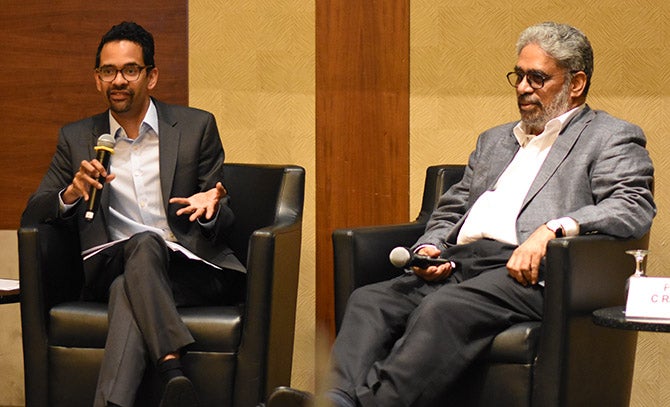
| Event Title: | ISAS Public Lecture |
| Topic: | The Bay of Bengal: History, Memory and the Future |
| Date/Time: | 05 July 2018 | 16:00 - 19:19 |
| Venue: | Left Chamber, Level 1, NUSS Guild House |
| Speaker/s: | Prof Sunil Amrith |
| Description: | Professor Sunil Amrith, Mehra Family Professor, Professor of History, Harvard University, and Academic Visitor of the Asia Research Institute gave a Public lecture on the Bay of Bengal: History, Memory and the Future. The ‘Question and Answer’ session was chaired by Professor Raja Mohan, Director, Institute of South Asian Studies, NUS.
During his address, Professor Mohan mentioned about how the Burma China and India Theatre and Second World War were overlooked perspectives of history as they seemed so remote from geopolitics when it reality it was not the case. He also spoke about the Bay of Bengal functioning as a strategic backwater. During his lecture, Professor Amrith mentioned about how after decades of neglect, the Bay of Bengal is now gaining strategic and economic importance. He also provided further insights on how Singapore, much more than Calcutta came to be the heart of the Bay of Bengal. Historical connections under the backdrop of the South Asian diaspora were reiterated through Professor Sunil Amrith’s sharing about the flourishing of print culture among the Tamil, Telugu and Bangla languages. Professor Amrith also spoke about the Roja Mutthaiya library which had Tamil publications. He further elaborated about the Tamil and Telugu speaking diaspora who had settled down in different part of Southeast Asia. Professor Amrith mentioned on how there was an increasing trend of migrations across the Bay of Bengal in the 1950s with the entry of Telugu porters from the Tungabhadra dam who were also Burma refugees. Professor Amrith also touched on the religious aspect of the Bay of Bengal. He went on to elaborate further about how scholarship was reviving the Indian Ocean as a geopolitical concept via taking advantage of kinship understandings and cultural links that also involved the religious tenets of Hinduism and Buddhism in South and Southeast Asia. For instance, the Sri Lankan Buddhist leader Anagarika Dhammapala revived Theravada Buddhism via the establishment of the Maha Bodhi Society in India. Profesor Amrith also stated that the Bay of Bengal’s crucial role in international politics was evident from India’s initiative of Project Mausam. It was described as a peaceful zone of cosmopolitan commerce. Professor Amrith also spoke about the arena of strategic competition between two rising powers that has formed in maritime. The idea of the Bay of Bengal emerging as a strategic point in light of the China’s Maritime Silk Road was also brought to attention by him. The lecture was concluded with the emphasis on the Bay of Bengal becoming a major area of research in academia given its primarily economic nature of integration under the context of diasporic connections that form the crux of migration, citizenship and identity. |
| Youtube: | https://youtu.be/PVd-chBvcvY |


